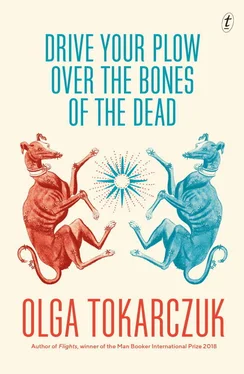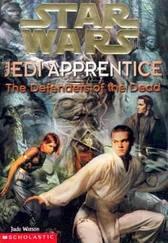‘I’m not “Janina”, I’ve asked you not to call me that before,’ I corrected her, but perhaps it was pointless. I knew what she was going to say – she was probably trying to boost her own self-confidence with these formalities.
‘Okay, Mrs Duszejko.’
‘Yes, I know. I’d rather you and the children listened to me and not the hunters. The things they say are demoralising for the children.’ The headmistress cleared her throat. ‘You’ve caused a scandal, and what’s more you did it in church. Worst of all, it happened in front of the children, for whom the person of the priest, and the place where it occurred, should be special.’
‘Special? All the more reason for preventing them from listening to such things. You heard it yourself.’
The young woman took a deep breath, and without looking at me, said: ‘Mrs Duszejko, you’re wrong. There are certain rules and traditions that are inherent in our lives. We can’t just reject them out of hand.’ It was plain to see that she was girding her loins now, and I knew what she was going to say.
‘But I don’t want us to reject them, as you put it. It’s just that I refuse to let anyone encourage children to do evil things or teach them hypocrisy. Glorifying killing is evil. It’s as simple as that.’
The headmistress rested her head in her hands and replied in a soft voice: ‘I have to terminate your contract. You must have guessed that already. It’d be best if you applied for sick leave for this term – that will be a nod in your direction. You’ve already been unwell, so now you can extend your sick leave. Please understand me – I have no other course of action.’
‘What about English? Who’s going to teach English?’
She turned red. ‘Our religious instruction teacher studied at a language school,’ she said, casting me a strange look. ‘In any case…’ She hesitated before going on. ‘Rumours have reached me before now of your unconventional teaching methods. Apparently you burn candles, some sort of fireworks during lessons, then other teachers complain about a smell of smoke in the classroom. The parents are afraid it’s something satanic, Satanism. Perhaps they’re just simple people… And you give the children strange things to eat. Durianflavoured sweets, for instance. What on earth is that? If any of them were poisoned, who’d be responsible? Have you ever stopped to think?’
These arguments of hers devastated me. I’d always done my best to surprise the children in some way, to excite their interest. Now I could feel all the strength draining out of me. I had lost the will to say anything more. I hauled myself to my feet and left the room without another word. From the corner of my eye I saw her nervously shuffling the papers on her desk; her hands were shaking. Poor woman.
I had everything I needed in the Samurai. Falling before my eyes, the Twilight was in my favour. It always favours people like me.
•
Mustard soup. It’s quickly made, without much effort, so I had it ready in time. First we heat a little butter in a frying pan and add some flour, as if we were going to make a béchamel. The flour sucks up the melted butter beautifully, then gorges on it, swelling with satisfaction. At this point we flood it with milk and water, half and half. That’s the end of the frolics between flour and butter, unfortunately, but gradually the soup appears; now we must add a pinch of salt, pepper and caraway to this clear, still innocent liquid, bring it to the boil and then switch off the heat. Only now do we add the mustard in three forms: whole-grain French Dijon mustard; smooth brown mustard or the mild, creamy kind; and mustard powder. It’s important not to let the Mustard boil, or else the soup will lose its flavour and go bitter. I serve this soup with croutons, and I know how much Dizzy likes it.
The three of them arrived together, and I wondered what sort of a Surprise they had for me; perhaps I had an anniversary of some kind – they were in such a serious mood. Dizzy and Good News had lovely winter jackets, identical, and it occurred to me that they really could make a fine couple, both so small and beautiful, like fragile snowdrops growing by the path. Oddball seemed gloomy, and spent ages shifting from foot to foot, rubbing his hands together. He had brought a bottle of chokeberry brandy, his own home produce. I never liked his homemade alcoholic drinks; in my view he skimped on the sugar and his liqueurs always had a bitter aftertaste.
By now they were sitting at the table. Still frying the croutons, I looked at them all together, maybe for the last time. That’s exactly what crossed my mind – that it was time to part ways. Suddenly I saw the four of us in a different way – as if we had a lot in common, as if we were a family. I realised that we were the sort of people whom the world regards as useless. We do nothing essential, we don’t produce important ideas, no vital objects or foodstuffs, we don’t cultivate the land, we don’t fuel the economy. We haven’t done any reproducing, except for Oddball, who does have a son, even if it’s just Black Coat. So far we’ve never provided the world with anything useful. We haven’t come up with the idea for any invention. We have no power, we have no resources apart from our small properties. We do our jobs, but they are of no significance for anyone else. If we went missing, nothing would really change. Nobody would notice.
Through the silence of the evening and the roar of the fire in the kitchen stove I heard sirens howling somewhere below, carried here from the village on a furious wind. I wondered whether they could hear this ominous sound too. But they were talking in hushed voices, leaning towards each other, calmly.
As I was pouring the mustard soup into ramekins, I was overcome by such strong emotion that my tears began to flow again. Luckily they were too involved in their conversation to notice. I stepped back to put the pan down on the worktop under the window, from where I watched them furtively. I saw Oddball’s pale, sallow face, his grey hair politely combed to one side and his freshly shaved cheeks. I saw Good News in profile, the beautiful line of her nose and neck, and a coloured scarf wrapped around her head, and I saw Dizzy’s shoulders, small and hunched, in a hand-knitted sweater. What’s going to become of them? How will these children cope?
And how will I cope? After all, I’m like them too. My life’s harvest is not the building material for anything, neither in my time, now, or in any other, never.
But why should we have to be useful, and for what reason? Who divided the world into useless and useful, and by what right? Does a thistle have no right to life, or a Mouse that eats the grain in a warehouse? What about Bees and Drones, weeds and roses? Whose intellect can have had the audacity to judge who is better, and who worse? A large tree, crooked and full of holes, survives for centuries without being cut down, because nothing could possibly be made out of it. This example should raise the spirits of people like us. Everyone knows the profit to be reaped from the useful, but nobody knows the benefit to be gained from the useless.
‘There’s a glow down there, in the village,’ said Oddball, standing by the window. ‘Something’s on fire.’
‘Sit down. I’ll serve the croutons,’ I said, once I had assured myself that my eyes were dry.
But they wouldn’t come to the table. They were all standing by the window, in silence. And then they looked at me. Dizzy with real anguish, Oddball with disbelief, and Good News furtively, with a sorrow that broke my heart.
Just then Dizzy’s phone rang.
‘Don’t answer it,’ I cried. ‘It’s via the Czech Republic, you’ll pay through the nose.’
Читать дальше












